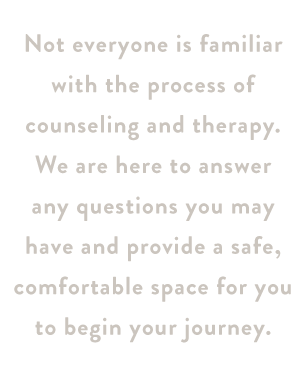



A. Is there any reason that my therapist could break my confidentiality?
As your therapist, I am bound by law to protect your confidentiality at all costs. This is crucial to building trust in the therapeutic relationship. The only limitations to complete confidentiality would be the following: 1) Threats, plans, or attempts to harm oneself, 2) threats, plans or attempts to harm someone else 3) abuse and/or neglect of a child or vulnerable adult.
B. Can my therapist prescribe medications?
A therapist is not a medical doctor and therefore cannot prescribe medication. A psychiatrist is a medical doctor that specializes in the diagnosis and treatment of those suffering from mental illness. Psychotropic medications are often most effective when paired with psychotherapy.
C. What is my part? Are there any expectations of me as a client?
In order for patients to reach their therapeutic goals, it is essential they attend their therapy sessions as scheduled. Participation in the process with honesty and engagement is of utmost importance. Make no mistake about it, therapy is work and thus requires time, effort, and a commitment that belies any spurious quick-fix notions around mental health. Increasing your satisfaction with life is an ultimate goal of therapy and one that you should expect to feel as the process moves along; but be aware that there may be particularly charged sessions along the way where you may feel uncomfortable or challenged—all this means is that you are engaged in the necessary work; so trust in the process. Throughout the therapy process, we identify goals, review progress, and modify the plan of treatment as needed.
D. What are the benefits/outcomes of therapy?
The therapeutic process seeks to meet goals established by all persons involved, usually revolving around a specific problem or concern. Participating in therapy may include benefits such as the resolution of presenting problems as well as improved intrapersonal and interpersonal relationships. The therapeutic process may reduce emotional distress, enhance stress management, and increase one’s ability to cope with problems related to work, family, the personal, the relational, etc. Participating in therapy can lead to greater understanding of personal and relational goals and values. This can increase relational harmony and lead to greater satisfaction with life. Progress will be assessed on a regular basis, and feedback from clients will be elicited to ensure the most effective therapeutic services are provided. There can be no guarantees made regarding the ultimate outcome of therapy.
